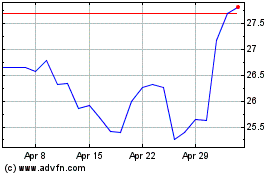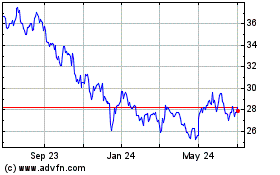U.S. 'Disappointed' by Japan's Plan to Cut Drug Costs
December 06 2016 - 2:50AM
Dow Jones News
TOKYO—The U.S. government has written to a senior aide of
Japan's Prime Minister Shinzo Abe, calling on Tokyo to reconsider a
plan that would allow more frequent pharmaceutical price cuts.
The letter from Secretary of Commerce Penny Pritzker describes
how the U.S. is "disappointed" by the Japanese plan to reduce drug
prices. Tokyo's policies "raise serious concerns about the
incentive structure for health-care products, as well as about the
market's predictability and transparency," it said.
Representatives of the U.S. Embassy in Tokyo and the prime
minister's office declined to comment on the letter, dated Dec. 2
and seen by The Wall Street Journal. A Commerce Department
representative didn't immediately have a comment. It wasn't clear
whether the letter was formally delivered to the aide, Chief
Cabinet Secretary Yoshihide Suga.
The U.S. Chamber of Commerce said it also sent a letter to Mr.
Abe making similar points.
"The letters from Secretary Pritzker and U.S. Chamber of
Commerce President Tom Donohue underscore the importance to
patients in Japan of a good climate for innovation," said Mark
Grayson, a spokesman for Pharmaceutical Research and Manufacturers
of America, a group representing drug companies.
Japan is one of the world's biggest pharmaceutical markets,
contending for the No. 2 position with China behind the U.S., the
biggest market. Japan's total spending on pharmaceuticals reached ¥
7.9 trillion ($69 billion) in the year ended March 31.
The Japanese government controls drug prices by setting the
price paid by its national health-insurance system. This makes
Japan's policy on drug pricing a matter of concern for U.S.
drugmakers such as Merck & Co. and Pfizer Inc., which sell
their products in the country.
Mr. Abe's government, facing large budget deficits, took steps
recently to curb its rising pharmaceutical bill. First it slashed
by half the price it pays for the cancer drug Opdivo—effective Feb.
1, 2017. The cost for a typical patient using Opdivo for a year
will fall to roughly $150,000 from $300,000.
Then, on Nov. 25, a council led by Mr. Abe called on the
government to consider reviewing drug prices annually instead of
every two years. The move would enable the government to reduce the
cost of high-price drugs more quickly, formalizing the tactic it
used in the Opdivo case.
Supporters of the changes say that Japan has been paying more
than other nations for Opdivo and that the government needs
flexibility to keep a lid on medical costs.
Without mentioning Opdivo by name, Ms. Pritzker's letter said
she was disappointed by "ad hoc changes to reduce pharmaceutical
reimbursement prices."
Japan's move on Opdivo followed publicity in the local press
about the high price of the drug, which came after a similar
backlash over drug costs in the U.S.
Bristol-Myers Squibb Co. markets Opdivo in the U.S., while
Osaka-based Ono Pharmaceutical Co., which was involved in
developing the drug in its early stages, markets it in Japan. In
the half-year ending in September, Ono said it recorded ¥ 53.3
billion ($468 million) in Opdivo sales.
An Ono spokesman said the company accepted the Japanese
government's decision to reduce the price of Opdivo. "We see the
importance of maintaining the public health insurance system for
the whole nation," the spokesman said.
Thomas M. Burton and William Mauldin contributed to this
article.
Write to Eleanor Warnock at eleanor.warnock@wsj.com and Megumi
Fujikawa at megumi.fujikawa@wsj.com
(END) Dow Jones Newswires
December 06, 2016 02:35 ET (07:35 GMT)
Copyright (c) 2016 Dow Jones & Company, Inc.
Pfizer (NYSE:PFE)
Historical Stock Chart
From Mar 2024 to Apr 2024

Pfizer (NYSE:PFE)
Historical Stock Chart
From Apr 2023 to Apr 2024
